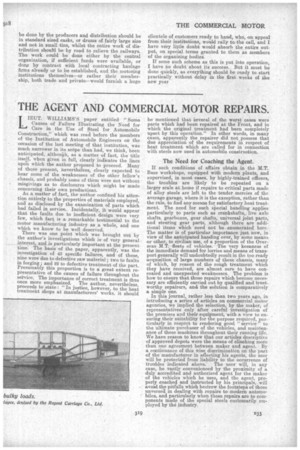THE AGENT AND COMMERCIAL MOTOR REPAIRS.
Page 11

If you've noticed an error in this article please click here to report it so we can fix it.
IEUT. WILLIAMS'S paper entitled "Some . Causes of Failure Illustrating the Need for ' Care in the Use of Steel for Automobile Construction," which was read before the members of the Institution of Automobile Engineers on the occasion of the last meeting of that institution, was much narrower in its scope than had, we think, been anticipated, althoUgh, as a matter .of fact, the title itself, when given in full, clearly indicates the lines upon which the author proposed to proceed. Many of those present, nevertheless, clearly expected to hear some of the weaknesses of the other fellow's chassis, and probably some of them were not without misgivings as to disclosures which might be made concerning their own productions. As a matter of fact, the author confined his attention entirely to the properties of materials employed, and as disclosed by the examination of parts which had failed in service. Incidentally, it would appear that the faults due to inefficient design were very few, which fact is a remarkable testimonial to the motor manufacturing industry as a whole, and one which we know to be well deserved. There was one point which was brought out by the author's investigations which is of very general interest, and is particularly important at the present time. The basis of the paper, apparently, was the investigation of 43 specific failures, and of these, nine were due to defective raw material ; two to faults in forging ; and 22 to defective treatment of the part. Presumably this proportion is to a great extent representative of the causes of failure throughout the service. The importance of correct treatment is thus once more emphasized. The author, nevertheless, proceeds to state : "In justice, however, to the heat treatment shops at manufacturers' works, it should be mentioned that 'Several of the worst cases were parts which had been repaired at the Front, and in which the original treatment had been completely upset by this operation." In other words, in many cases, apparently the repairer did not possess that due appreciation of the requirements in respect of heat treatment which are called for in connection with steels now used in automobile construction.
The Need for Coaching the Agent.
If such conditions of affairs obtain in the M.T. Base workshops, equipped with Modern plants, and supervised, in most cases, by highly-trained officers, the troubles are likely to be repeated on a larger scale at home if repairs to critical parts made of alloy steels are left to the tender mercies of the average garage, where it is the exception, rather than the rule, to find any means for satisfactory heat treatment. The need for such special handling applies particularly to parts such as crankshafts, live axle shafts, gearboxes, gear shafts, universal joint parts, and steering gear parts, although there are additional items which need not be enumerated here. The matter is of particular importance just now, in view of the anticipated handing over, by some means or other, to civilian use, of a proportion of the Overseas KT. fleets of vehicles. The very keenness of the immediate demand for lorries and means of transport generally will undoubtedly result in the too ready acquisition of large numbers of these chassis, many of which, by reason of the rough treatment which they have received, are almost sure to have concealed and unexpected weaknesses. The problem is how to ensure that those repairs which become necessary are efficiently carried out by qualified and trustworthy repairers, and, the solution is comparatively a simple one. In this journal, rather less than two years ago, in introducing a series of articles on commercial motor agencies, we implied the selection, by the maker, of representatives only after careful investigation of the premises and their equipment, with a view to ensuring their suitability for the purpose required, particularly in respect to rendering good " service " to the ultimate purchaser of the vehicles, and maintenance of those machines throughout their running life. We have reason to know that our articles descriptive of approved depots were the means of clinching more than one agreement between maker and agent. By a continuance of this wise discrimination on the part of the manufacturer in selecting his agents, the user will be protected from liability to the occurrence of troubles indicated above. The user will, in any case, be vastly convenienced by the proximity of a duly accredited and authorized agent for the maker of the vehicles which he uses, and the agent, properly coached and instructed by his principals, will avoid the pitfalls which bestrew the footsteps of those unversed in dealing with repairs to modern automobiles, and particularly when those repairs are to components made of the special steels customarily employed by the industry.






















